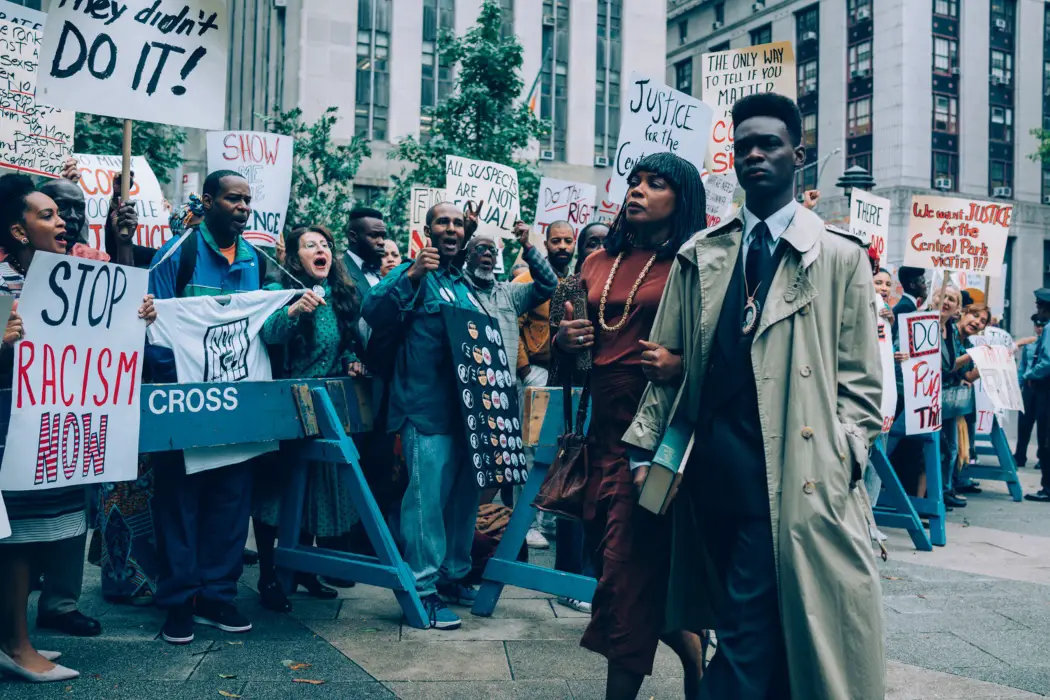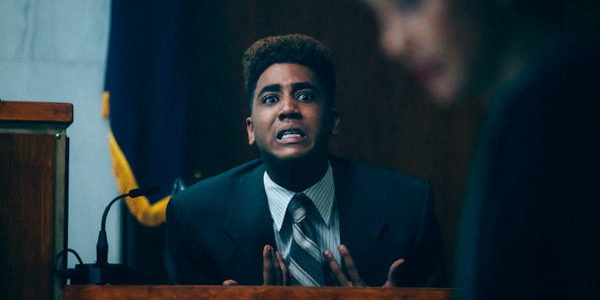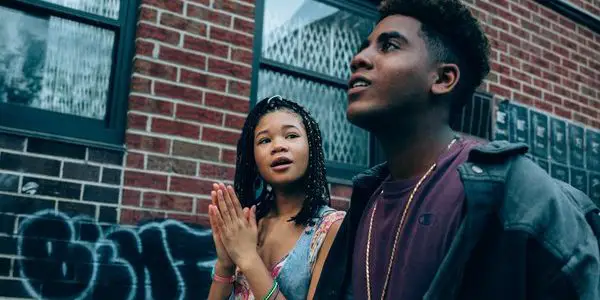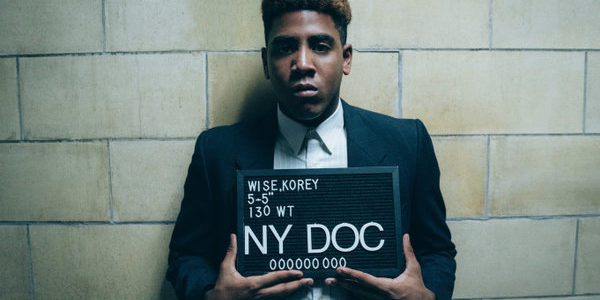WHEN THEY SEE US: A Haunting, Vital Miniseries

Raymond Santana, Kevin Richardson, Antron McCray, Yusef Salaam, Korey Wise. These are the names of the men, known as the Central Park Five, whose lives were upended one night in 1989. They were apprehended and interrogated not simply because they were in the wrong place at the wrong time, but because — according to the police — they looked the part. The part of thugs, rapists, and “animals,” as they’re frequently called by their prosecutors in Ava DuVernay‘s excellent new miniseries When They See Us.
The series largely concerns itself with reclaiming one’s narrative — the five were only kids when they were picked up and accused of crimes they didn’t even understand, while their stories were often heard second hand, from law enforcement and the media. But now it’s time for their side of the story to be heard.
The Before
“Part One” opens with the before, the calm before the inevitable storm where the boys are shown doing what kids do — skipping school, staying out with their friends, etc. But when trouble starts in Central Park, the police make it their business to round up anyone who they deem suspicious (see: young people of color). They scour the park in a sequence that feels straight out of a horror movie, looking for anyone who’ll fit their description.

It’s here that they come across Trisha Miele (Alexandra Templer), beaten, raped and clinging onto life. This sends prosecutor Linda Fairstein (Felicity Huffman) into a fury, as she desperately seeks to pin the crime on anyone who she believes looks the part. As a result, the police round up a group of local boys, several of whom did not even know each other, and implicate them in this brutal attack.
What follows is a series of frightening interrogations, as the boys (here played by Marquis Rodriguez, Asante Blackk, Caleel Harris, Ethan Herisse, and Jharrel Jerome) are coerced and intimidated into making confessions, none of which even line up with one another’s. DuVernay plays up the intensity of the situation — framing the detectives as the towering presences they must have appeared as to these young boys and furiously cross-cutting between each of the five’s interrogations. It’s a haunting sequence, giving the viewer an effective approximation of what it must have been like to feel powerless in the face of those meant to protect you.
“Part One” ends with an image that will stick with me for some time — Korey Wise’s face, once tinged with youthful exuberance, looking utterly terrified as he’s carried out of the precinct, police lights covering him in a flash of red. Jerome gives one of the strongest performances you’re likely to see this year, his eyes conveying every feeling of fear, confusion, and later, hopelessness.
The Trial
If “Part One” illustrates how quickly false conclusions can be reached, “Part Two” shows the lengths prosecutors and law enforcement went to in order to back up their claims, using race-baiting tactics to mine every ounce of fear out of the jury. The five have little control over what’s going on here, their fates constantly being decided by outside forces, many of which do not have their best interests at heart.

It seems intentional then, that they almost sink into the background for most of this second episode, which is no more evident in a scene where their parents discuss a plea deal with the lawyers. DuVernay frames them all at arm’s length from this discussion, their discomfort about pleading guilty to a crime they didn’t commit emphasized as they begin to realize how out of their hands this whole process is.
The trial scenes have an air of dread to them — you might know exactly what the verdict is going to be but you can’t help but wish otherwise. We get all the rises and falls of a good courtroom drama — the boys’ lawyers unexpectedly stepping up to the plate, evidence that proves to be inconclusive — but with the case stacked in the prosecution’s favor, the boys are found guilty.
The Aftermath
Parts three and four jump forward, dealing with how the five deal with incarceration, how it affects their families and what their lives are like once they get out. Three keeps the focus on Raymond, Kevin, Antron, and Yusef, while Korey’s prison story is told in its entirety in the final episode (he was the only one of the five who was sixteen during the trial and as such served in an adult prison instead of juvie).
During their time in juvenile prison, their mothers continue protesting their innocence, while facing problems of their own — from the way they’re perceived by their co-workers to conflict with each other, and struggles to get by while still visiting their sons.

And by the time Raymond, Kevin, Antron, and Yusef are released, their struggles are far from over. It’s here that they’re replaced by Freddy Miyares, Justin Cunningham, Jovan Adepo, Chris Chalk, all of whom do an excellent job of embodying these characters in their later years. We see how incarceration changes them, from having to register as sex offenders (which affects them on both a personal and professional level) to the constant reminders of how people see them, an idea that goes back to how the five were originally perceived during the trial. Their attempts to make a life for themselves are constantly thwarted and here DuVernay makes some poignant observations about what it means to have missed out on the most important years of one’s life.
But the question of what happened to Korey hangs over the third episode, making for an absolutely devastating finale that encapsulates the series’ mission statement and shows that closure is possible, if not easy. Jharrel Jerome continues to portray Korey into his later years, as his story goes in increasingly harrowing directions, his facial expressions continuing to bring pathos to the character.
It’s some of the finest storytelling of any show currently on television, using the format to really dig deep into Korey’s psyche and giving his extraordinary story the time it deserves. The subtle changes in Jerome‘s performance, along with the stellar make-up and hair job, go a long way to sell how he’s aged both physically and mentally in this time, in addition to the massive trauma inflicted upon him. The details of his prison time are truly horrifying, reminding us of the real human cost at the core of this story and the strength it takes to endure such harrowing times.
The Verdict
When They See Us is a towering accomplishment by DuVernay and co., who consistently find the best interactions to focus on and the best angle to tell the story from. This is the five’s story and she tells it with such compassion, such rich detail, in a way that not only shows us not only how such a miscarriage of justice was allowed to happen but also how far we’ve still got to come (her brilliant 2016 documentary, 13th, will make for a sobering companion piece).
Bradford Young‘s cinematography works in perfect unison with what DuVernay is going for, capturing the vibrancy of the boys’ lives before and contrasting it with the darkness that lies ahead, in courtrooms and police precincts. His work, recently seen in last year’s Solo: A Star Wars Story, is muted but never unintelligible, making it a unique departure from anything else you’ll see on television.
The supporting cast, filled out by tremendous talents like Michael K. Wiliams, Famke Janssen, and A Wrinkle In Time‘s Storm Reid, are all in service of well-drawn characters with their own inner conflicts, from the struggling parents to the in-over-their-heads lawyers. Vera Farmiga does particularly great work as the contemptable district attorney Elizabeth Lederer, giving weight to what could be a one-note character, given the circumstances of her position in the case.
If the series has any flaws, they’re in the fact that several story threads — most notably that of Raymond being sent back to prison on drug charges— fall off the map slightly in order to wrap things up in a timely manner. It’s a small price to pay for the triumphant ending we get, but this viewer can’t help but wonder what might have come from dramatizing such a significant part of Raymond’s life.
When all is said and done though When They See Us may well go down as DuVernay‘s finest work — an empathetic look at a landmark case that forever changed the lives of five young men. A series that aims, and succeeds, to set the record straight, without sensationalizing the case, telling a deeply human story about the way people of color have been and continue to be seen. About the deep-seated racism at the heart of cases like these and the cost of such injustice.
Have you see When They See Us? What did you think? Tell us your thoughts in the comments below!
When The See Us is currently available on Netflix!
https://www.youtube.com/watch?v=u3F9n_smGWY
Does content like this matter to you?
Become a Member and support film journalism. Unlock access to all of Film Inquiry`s great articles. Join a community of like-minded readers who are passionate about cinema - get access to our private members Network, give back to independent filmmakers, and more.













